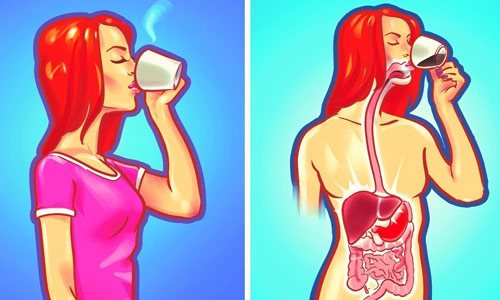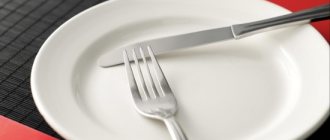Chemical composition
Natural coffee, like other products, can bring benefits and harm. It all depends on who drinks the drink and in what quantities. To understand what effect the product has on the human body, it is worth taking a closer look at its qualitative composition.
Coffee contains the following components:
- caffeine;
- nicotinic acid;
- trigonelline;
- tannins;
- microelements;
- amino acids.
Someone drinks coffee with milk and decides that if diarrhea begins after drinking the drink, it’s the milk. This is possible in the presence of enzyme deficiency.
Is it okay to drink coffee drinks if you have diarrhea?
Although some people believe that the drink has a fastening effect, health professionals are strongly against consuming black coffee with sugar for diarrhea. In addition, under the influence of its components, the gastric and intestinal walls are irritated.
It is not recommended to drink black coffee if you have diarrhea.
Large amounts of caffeine can worsen diarrhea with the following symptoms:
- rapid heartbeat;
- high blood pressure;
- manifestation of swelling;
- headaches.
If you ignore the recommendations and drink the drink, then the diarrhea may intensify, and its course will worsen, due to which dehydration of the body will occur, which is extremely dangerous.
In addition, diarrhea from coffee with milk may increase. This product, entering the gastrointestinal tract, does not completely coagulate under the influence of enzymes, thereby increasing the load on the intestines. As a result, active fermentation begins, irritation and, consequently, diarrhea increase.
From this video you will learn more about the benefits and harms of coffee:
Product properties
The chemical composition determines the properties, that is, how drinking the drink affects the body. As you know, most people drink this drink for aesthetic satisfaction and to get a dose of vigor and energy. Is this thinking justified?
Actually, yes. The human condition is affected by caffeine that enters the body with a cup of fresh ground coffee. Caffeine stimulates increased mental and physical activity. As a result, a person feels more energetic and becomes more resilient and gains strength.
Due to the fact that the drink contains nicotinic acid, normal synthesis of B vitamins becomes possible. In addition, this substance supports metabolic processes in the body.
Interestingly, the tart, specific coffee aroma released during grinding and brewing is possible thanks to a special component included in the drink. This is trigonelline. When ground grains are heated during roasting or boiling, the aroma becomes especially intense due to the activation of this substance.
Tannins have a slight strengthening effect on the body. These components are similar to those contained in black tea, and as you know, diarrhea is often relieved with the help of a black, unsweetened drink.
Microelements are necessary for every person. By drinking 2-3 cups a day, you can support your body by replenishing it with valuable components.
The amino acids included in the product increase endurance and emotional stability. That's why many people prefer to refresh themselves with a cup of aromatic coffee throughout the day.
How is diarrhea caused?
To find out the reason for the development of intestinal upset from drinking coffee, it is worth understanding the mechanism of the drink’s effect on digestion. Of course, everyone’s body has its own unique characteristics and the reaction that manifests itself in one is not standard. At the same time, it is important to consider several factors.
No matter how healthy coffee drinks are, some substances contained therein have an irritating effect on the stomach. For example, caffeine and nicotinic acid irritate the gastric mucosa. This leads to increased peristalsis. Gastric juice is secreted more actively, the person begins to feel intense hunger.
As already mentioned, the risk of developing diarrhea after drinking coffee increases when a person adds milk to the drink. This product is not always well absorbed by the adult body. As a result, the ability to properly digest food decreases and diarrhea begins.
You should not drink coffee in moments of extreme stress. Immobilization of a person’s internal forces occurs only when the drink is taken in a calm environment. In other cases, stimulation of the central nervous system may increase, and intestinal upset begins.
A coffee drink has a similar negative effect when it is drunk on an empty stomach and done frequently. Coffee in large quantities on an empty stomach is perceived differently by the body. He regards it as a toxic compound. The body is trying to free itself from it. As a result, diarrhea develops. Sometimes such conditions are accompanied by sudden nausea and vomiting.
The most severe irritation of the mucous membrane of the digestive tract is caused by drinking instant coffee. It contains not only natural compounds. These chemical inclusions are perceived by the body as potent toxins. As a result, diarrhea begins, which usually does not last long, but is characterized by wateriness and a short interval between drinking the drink and the act of defecation.
The risk of developing diarrhea due to drinking aromatic coffee drink is greater for those who drink it rarely. Those who delight themselves with a cup of their favorite coffee regularly, 2-3 cups a day, usually do not suffer from diarrhea. However, it is worth considering that with regular consumption of an invigorating drink, its stimulating effect is less pronounced and this is due to the body becoming accustomed to the serving size of caffeine and other active substances.
Effect of coffee grounds and drink temperature
The condition of the intestines after drinking coffee can be affected by:
- the presence of grounds;
- product temperature.
Surprisingly, in some cases, intestinal upset is caused not by the coffee itself, but by the grounds that have settled at the bottom. To eliminate the risk of it entering the body, you should use special filter bags or brew coffee in a coffee machine, where the grounds are separated during the preparation process.
How the body perceives coffee is affected by its temperature. A drink that is too hot or too cold has a negative effect. This temperature causes the digestion process to stop. As a result, food simply moves through the intestines. Since the temperature is uncomfortable for the body, the digestive system strives to quickly remove these products and, as a result, diarrhea begins.
How to drink coffee for diarrhea - Tips
- Is it possible to drink coffee if you have loose stools?
- Why does diarrhea develop after drinking coffee?
- Coffee for diarrhea
- Can I drink coffee if I have diarrhea?
- Coffee for diarrhea: composition, benefits and alternatives
- Can I drink tea and coffee for diarrhea? Causes of diarrhea, diarrhea, why do frequent loose stools appear?
- Types of diarrhea, what types of diarrhea are there?
- Composition of green and black tea, is it possible to drink tea for diarrhea?
- Composition of coffee, can you drink coffee if you have diarrhea?
- Is it possible to drink tea if you have an intestinal disorder?
- Can coffee cause diarrhea, diarrhea from coffee, causes
- What should you eat to get rid of diarrhea and relieve the symptoms of diarrhea?
- When does coffee help with diarrhea? When can you drink it for diarrhea?
- What foods can help get rid of diarrhea and diarrhea?
Intestinal upset is a problem that every person has to face at least several times in their life.
It often happens that loose stools occur regularly, and many do not even realize that daily drinks or meals are the culprits.
Doctors warn that despite the fact that alternative medicine recommends drinking coffee for diarrhea, it is better to refuse such treatment. The active components contained in the aromatic liquid can cause undesirable consequences.
Why is it better to stop drinking coffee?
The peculiarity of the coffee drink is its composition. People with weak intestines may experience diarrhea from coffee - the active ingredients irritate the digestive organs, causing loose stools. If you have diarrhea, drinking liquid can have other undesirable consequences. An increased concentration of caffeine can complement attacks of diarrhea with other manifestations:
- rapid heartbeat;
- increased blood pressure;
- headaches;
- the appearance of swelling.
Another danger hidden in an invigorating drink is that if you abuse coffee, there is a risk of increasing the intensity of loose stools. Drinking liquids with added milk is considered especially dangerous.
The cow-made product puts an active load on the intestines, provokes fermentation, and increases diarrhea. Drinking coffee for diarrhea causes disturbances in intestinal motility and active production of hydrochloric acid.
To prevent more dangerous health complications, it is better to abstain from your favorite drink.
In what cases is it permissible to drink coffee?
An invigorating drink does not always have a negative effect on the body and increases the intensity of attacks of diarrhea.
Only a product made from coffee beans can provoke undesirable consequences. Acorn or barley coffee for diarrhea is a useful remedy to cope with the problem.
The active components contained in acorns or barley grains have remarkable qualities:
- improve the functioning of the digestive organs;
- cleanse the intestines of toxins that cause loose stools;
- normalize metabolic processes;
- strengthens feces;
- relieve the load on the pancreas;
- eliminate increased gas formation and cramps;
- destroy harmful microorganisms;
- relieve unpleasant discomfort in the abdominal area.
Attacks of diarrhea often provoke inflammatory processes in the intestines, which bring additional troubles. A remedy made from acorns or cereals actively affects the source of inflammation, stopping its growth.
Proper preparation and use of coffee anti-diarrhea remedy
When using coffee made from acorns or barley grains to get rid of attacks of diarrhea, you should remember that you should not abuse the invigorating liquid.
Using the product more than three times a day is strictly prohibited.
It is also recommended to carefully monitor your sensations - if there is a general deterioration in health, diarrhea does not lose intensity, treatment should be stopped immediately. Preparation:
- Place natural coffee made from acorns (barley) in a small metal container. To prepare a portion of the product you will need 20 grams. product.
- Bring water (200 ml) to a boil, pour in the raw materials.
- Place the container on low heat, simmer for five minutes, do not let it boil.
- Infuse with the lid tightly closed for 3-6 minutes.
Drink the prepared product in one go. You should not add sugar - the sweet component can reduce the effectiveness of the active components on loose stools. It is strictly forbidden to give liquid to children, even in small quantities. It is best to take these treatments after a meal - on an empty stomach, even a healthy home remedy can cause a number of unpleasant symptoms.
Important!
It is important to prepare a fresh product each time before use. Even short storage in the refrigerator affects the beneficial qualities of coffee. The duration of treatment should not exceed 2-3 days.
Doctors warn that despite the numerous beneficial qualities of the drink, it will not be possible to cope with diarrhea without additional pharmaceutical drugs or alternative medicine.
In order to forget about frequent visits to the toilet for a long time, it is recommended to carry out a complex effect on loose stools - use an effective medication or home remedy for treatment and increase its effect with a coffee drink.
Coffee is a drink that has become famous for its many benefits, but they are not always beneficial. Improper use or careless attitude to medical recommendations can intensify attacks of diarrhea, provoke additional problems, and cause undesirable consequences. It is better not to engage in experiments - this will avoid dangerous manifestations.
Source: https://sovetdo.ru/kak-upotreblyat-kofe-pri-diaree.html
Does coffee help with intestinal upset?
Opinions differ on whether you can drink coffee when you have diarrhea. Coffee for diarrhea rarely has a fixing effect, since at the time of drinking the drink the intestinal mucosa is already sufficiently irritated and the tannins contained in the drink are unable to have the desired effect.
When deciding whether coffee is ok during diarrhea, it is worth considering that the drink has a diuretic effect. During the period of disorder, the body is dehydrated. Additional fluid removal will only worsen the situation. Therefore, instead of coffee, it is better to drink more pure water or strong black tea.
If diarrhea develops, medical attention is usually not required. However, when the condition persists for several days without relief, you may need to see a doctor.
Paying close attention to your body will help you always feel good. Moderate consumption of coffee will give strength and energy every day without causing harm to the body.
The information on our website is provided by qualified doctors and is for informational purposes only. Don't self-medicate! Be sure to consult a specialist!
Gastroenterologist, endoscopist. Doctor of Science, highest category. Work experience 27 years.
Caffeine is known as a mental and concentration stimulant; For many people, it is a familiar component of the daily diet. However, not everyone can tolerate its use without consequences - complaints often arise about the development of diarrhea. Read on to find out whether you can drink coffee if you have diarrhea and whether there is a causal connection with stool disorder.
Why is it better to stop drinking coffee?
The peculiarity of the coffee drink is its composition. People with weak intestines may experience diarrhea from coffee - the active ingredients irritate the digestive organs, causing loose stools. If you have diarrhea, drinking liquid can have other undesirable consequences. An increased concentration of caffeine can complement attacks of diarrhea with other manifestations:
- rapid heartbeat;
- increased blood pressure;
- headaches;
- the appearance of swelling.
Another danger hidden in an invigorating drink is that if you abuse coffee, there is a risk of increasing the intensity of loose stools. Drinking liquids with added milk is considered especially dangerous. The cow-made product puts an active load on the intestines, provokes fermentation, and increases diarrhea. Drinking coffee for diarrhea causes disturbances in intestinal motility and active production of hydrochloric acid. To prevent more dangerous health complications, it is better to abstain from your favorite drink.
Can coffee cause diarrhea?
An increase in bowel movements is indeed associated with the consumption of this drink. There are a number of reasons why stool disorder occurs:
This component stimulates peristalsis - contractions of the intestines, which leads to accelerated evacuation of the contents of the digestive tract, discomfort in the abdomen and loose stools.
- Allergy to the components of the drink.
The reaction of individual sensitivity in some people is expressed in a disorder of normal bowel movement. Both caffeine itself and additives - dyes, flavors, taste enhancers - can act as an allergen.
It is not directly related to caffeine, but requires close attention when diarrhea occurs in combination with abdominal pain and flatulence. It should be discussed if milk is added to a drink, but the lactase enzyme necessary for its high-quality breakdown is too small.
After reading the list of causes of diarrhea caused by drinking coffee, a logical question arises: why do some people start their morning with it every day, while others are forced to visit the toilet after even taking a few sips? Firstly, a lot depends on the concentration of the active substance: in a cup of instant drink it is lower than in espresso. Secondly, individual characteristics influence the presence of diseases of the digestive tract (caffeine irritates the mucous membrane, provokes gastroesophageal reflux and heartburn).
Thus, coffee can cause diarrhea and requires caution when consumed in people with chronic gastrointestinal pathologies.
At the same time, tea (black, green) and cola do not provoke stool upset, since they contain less active peristalsis stimulants than a cup of coffee. But if you drink too much of them in a day (more than 5-7 standard volumes equal to 200 ml), diarrhea is also likely.
Diarrheal syndrome caused by the consumption of caffeine-containing drinks manifests itself moderately or violently - diarrhea is not an independent disease, but a separate symptom that can be associated with various reasons.
Abnormal bowel movements due to caffeine sensitivity
In this case, you can find out the presence of:
- long-term intolerance to the drink;
- chronic gastrointestinal diseases or irritable bowel syndrome.
Patients usually adhere to a diet that excludes fried, fatty, spicy foods - they, like coffee, almost immediately after consumption cause abdominal discomfort, nausea, bloating, heartburn and stool upset. There may be a tendency to constipation, diarrhea, or alternation of these bowel movements. Diarrhea caused by coffee is characterized by:
- The appearance of liquid feces from 2 to 6 times a day.
- Heaviness in the stomach.
- Nausea.
- Bloating, flatulence.
Usually, if the patient no longer drinks coffee, the symptoms disappear fairly quickly even without any treatment. Sometimes a person is also bothered by a headache and an unpleasant taste in the mouth.
Allergy to any components of coffee
People who develop an individual intolerance to dyes, flavors or other ingredients of the drink are often sensitive to foods: citrus fruits, nuts, chocolate, tomatoes. Most likely, in the past they have already noticed an itchy skin rash, a runny nose with profuse watery discharge, or other symptoms characteristic of allergies, and caffeine was not necessarily the trigger. However, it is also impossible to exclude sensitivity that has manifested itself for the first time.
- nausea;
- vomiting;
- cramping abdominal pain;
- flatulence;
- diarrhea.
They can occur immediately or several hours after drinking coffee. Sometimes they are combined with a rash, runny nose, cough, as well as swelling of the lips, cheeks, eyelids, and lacrimation.
Lactase deficiency
It is often mistakenly considered a “children’s” diagnosis, while many adults who consume caffeine-containing drinks also suffer from it. People who add dairy products to their cup are at risk. They contain a special carbohydrate - lactose, the breakdown of which requires the participation of a special enzyme. If it is not enough, symptoms occur:
- Diarrhea - the stool is liquid, foamy, light yellow in color with a sour odor.
- Flatulence, feeling of heaviness, colic and rumbling in the stomach.
- Nausea, sometimes vomiting.
Diarrhea appears immediately after drinking a cup of coffee (tea) with milk or after some time.
No specific therapy is required. In case of allergies, it is necessary to find out which component causes the reaction and completely stop using it (elimination method). In case of lactase deficiency, it is worth limiting foods with milk sugar and considering the possibility of using enzyme replacement therapy (Lactazar).
Nutrition correction
If a person discovers sensitivity to caffeine-containing drinks, he should follow the diet for several days. Excluded:
- fatty, fried, smoked, spicy foods;
- excess sugar;
- baked goods, legumes, nuts, peanuts;
- products with caffeine (all drinks that contain this component, as well as chocolate bars, cookies, etc.).
During the period of acute diarrhea, preference should be given to mucous soups, lean meats, boiled rice, dried bread and biscuits. Fruits and vegetables, dairy products and packaged juices are excluded.
If you have diarrhea, drink enough fluids to prevent dehydration.
Boiled or mineral still water and herbal tea are suitable (as tolerated). After normalization of the condition, nutrition is planned in accordance with the main pathology (allergies, lactase deficiency).
Drug therapy
For mild disorders, it is not used, but if bowel movements are repeated too often and threaten dehydration, and bloating causes significant discomfort, symptomatic drugs are used:
- Sorbents with antidiarrheal effect (Smecta, Enterosgel).
- Carminatives – that is, drugs used for flatulence (Simethicone, Espumisan).
- Peristalsis inhibitors (Loperamide, Imodium).
With frequent episodes of diarrhea, rehydration solutions may be needed (Ionica, Gastrolit). They are drunk to eliminate dehydration. However, if the patient does not feel thirsty, maintains his appetite and usual diet, his skin does not become dry, there is no dizziness, or repeated vomiting, then you can do without them. At the same time, you should drink enough water and get fluids from soups and other dishes in the daily menu.
Is it possible to drink coffee if you have diarrhea?
Some people use this drink as a fixative for stool upset, but medical experts do not recommend resorting to this method of dealing with diarrhea. It is better to give preference to diet, the use of sorbents and probiotics (preparations with live cultures of bacteria), since coffee with diarrhea can lead to irritation of the mucous membrane of the gastrointestinal tract. In addition, this drink, while temporarily increasing the tone of the body, after a few hours gives the opposite effect - fatigue, weakness. A bowel disorder already exhausts the patient, and such “swings” aggravate the condition and slow down the recovery processes.
It is especially not recommended to drink coffee if you have diarrhea:
- children;
- pregnant women;
- nursing mothers;
- To old people.
These categories of patients are most vulnerable to the irritating effects of the drink - especially on an empty stomach. In addition to the risk of increased diarrhea, they may experience frequent urination - another side effect of the active ingredients. The unpleasant effects are more pronounced if a person smokes cigarettes at the same time as drinking a cup of coffee.
You can drink coffee for diarrhea if it is made from acorns. It is prohibited to treat diarrhea on your own. This is due to its chemical composition and the clinical picture of the phenomenon under consideration.
Coffee for diarrhea
Stool disorder can manifest itself as a result of disruption of the gastrointestinal tract; disruptions occur due to intoxication, concomitant diseases or food poisoning.
Let's find out whether you can drink coffee if you have diarrhea or constipation. Unfortunately, sometimes health fails. Abnormal bowel movements that catch a person at the wrong moment disrupt all plans. They bring a lot of inconvenience and unpleasant sensations: bloating, pain.
As a result, you have to carefully select foods and drinks to consume. Some should be avoided altogether, including strong natural coffee. After all, coffee does not have a fixing effect for diarrhea.
On the contrary, it has an irritating effect on the intestinal walls and stimulates loose stools.
Chemical component of coffee
Despite all the warnings, coffee lovers do not stop drinking coffee if they have diarrhea. Thus exacerbating the problem. Yes, the benefits of the drink are striking, but in some situations it can be harmful. To understand how its effect on body systems occurs, it is necessary to study its components.
Coffee beans contain large amounts of caffeine. The component stimulates the nervous system, gives vigor and physical endurance to a person. Strong espresso contains a substance rich in B vitamins - nicotinic acid, which takes part in the metabolic system.
Trigonelline gives a pleasant bright smell to the drink when heated; the component belongs to the group of alkaloids. Mental activity is stimulated by tannins and microelements (magnesium, calcium, potassium).
When a person does not have health problems, even a double espresso will not harm him. The drink will enrich his body with many microelements, amino acids, proteins, and vitamins. They will improve the functioning of the metabolic system and increase metabolism.
If a patient has an exacerbation of diseases of the gastrointestinal tract (diarrhea, constipation), then coffee acts as a laxative due to its high content of microelements. They irritate the walls of the stomach and intestines and cause diarrhea after coffee.
If you have diarrhea, then drink warm tea as a drink that restores normal processes in the intestines. After all, coffee weakens the stool.
Causes of diarrhea
The causes of diarrhea may be the following:
- Poisoning from low-quality products.
- Exacerbation of gastrointestinal diseases as a result of dietary disorders.
- Infection with parasites that infect the intestines.
- Excessive consumption of foods containing sucrose.
- Bacterial lesions of the gastrointestinal tract.
With diarrhea, the gastrointestinal tract malfunctions and the absorption of fluid and microelements is disrupted. Loose stools occur when:
- Damage to the mucous membranes of the stomach and intestines. If the mucous membrane is inflamed or its integrity is compromised, then fluid is retained in the intestines. And its excess does not allow the nutritional components to be properly absorbed. Feces are formed. Compounds are formed that develop excessive osmotic activity. A high glucose content, for example, contributes to disturbances in fluid metabolic processes and dilution of chyme.
- Infections with harmful bacteria or other microorganisms. Damage to the intestinal walls by bacteria leads to flatulence; pathogenic microorganisms also accumulate on the walls and cause disturbances in the passage of feces.
- Strengthening the peristalsis of contractions of the intestinal walls. Increased peristalsis has a negative impact on food absorption. Food is not digested as it should be due to rapid movement along the inner surface of the intestines.
- Increased amount of liquid in chyme and excess microelements.
Doctors strongly do not recommend drinking coffee if you have diarrhea. The drink will not only aggravate gastrointestinal disorders, but will also worsen the general condition of the patient. The patient will experience headaches, swelling, increased blood pressure, and heart rhythm disturbances.
If diarrhea continues for a long period of time, you should not self-medicate. Contact a specialist for help.
Why does coffee cause constipation and diarrhea?
When coffee makes you want to go to the toilet, it means the person has problems with the intestines or internal organs. Persons with chronic gastrointestinal diseases do not tolerate this drink well.
It is undesirable to drink coffee with milk during exacerbations of diseases. Fermented milk products in such cases are also not recommended for consumption. Milk or kefir causes bloating and discomfort in the abdominal region.
Fermented milk is poorly absorbed in the intestines and creates a favorable climate for the development of pathogenic bacteria.
If there are no problems with pathologies of internal organs, then coffee is generally well tolerated. The only thing is that consuming it with fatty meat or legumes, onions, and onions can make a person feel unwell. Thanks to this combination of products, loose stools will appear over time.
It has already been said that if you have diarrhea, it is better not to drink the drink, but is coffee good for constipation or not?
There are people who have constant problems with bowel movements. This indicates poor nutrition.
In such situations, you can use coffee for constipation. Espresso will make defecation easier. But be sure to follow the rules for drinking the drink:
- do not abuse strong drinks; no more than two cups of espresso from natural coffee beans are allowed;
- drink the drink an hour after your meal;
- after espresso, drink 125 ml of water;
- give preference to an unfiltered drink, this coffee will enhance peristalsis.
The drink itself can also cause constipation. If a person gets constipated from coffee, then he abuses the strong drink. As a result, the intestines become exhausted and the stool becomes dense. Without outside help, their departure is impossible.
Excessive consumption of strong coffee with sugar is dangerous. Intestinal spasms may develop, and defecation becomes difficult in these cases.
During an exacerbation of gastrointestinal diseases, it is important not only to treat with medications and reduce or completely eliminate coffee from the diet, but also to follow a diet. Coffee lovers who cannot refuse the drink can drink coffee made from barley and acorns. This drink is drunk for diarrhea.
Source: https://x-coffee.ru/kofe-pri-diaree/
Composition of the product
To find out whether you can drink coffee with diarrhea, it is recommended to consider the composition of this drink.
The contents of the coffee product are somewhat similar to the composition of green tea, since tannin is present - tannin and B vitamins. But after heat treatment, most of the beneficial components are lost.
Coffee contains citric, malic, and chlorogenic acid. After roasting, the amount of caffeine decreases, and pronounced stimulation is observed on the SS and NS.
Combining the alkaloid with the above acids can improve absorption and motility. The positive effects of coffee are observed only in the gastrointestinal tract, in the absence of pathologies.
It has been proven that caffeine stimulates the nervous system, increasing activity and physical endurance. If you drink coffee with gastrointestinal disorders, why might diarrhea worsen?
This effect is achieved due to the presence in coffee of a high content of microelements that irritate the gastrointestinal mucosa.
The drink also has a laxative effect. Therefore, after consuming it, loose stools increase and diarrhea worsens.
The effect of the drink on the gastrointestinal tract
Coffee seeds contain active chemical compounds that help intensify metabolic processes and blood supply in various organs and systems. At the same time, they increase fluid secretion.
Therefore, after drinking a cup of coffee, there may be water retention in the stool. This contributes to the rapid movement of masses through the intestines, which provokes diarrhea. Modern gastroenterologists do not recommend drinking coffee if you have diarrhea.
The risk group includes patients with chronic gastrointestinal pathologies, which are accompanied by gas formation. After coffee, this process only intensifies.
Why is it not recommended to drink coffee with milk? This combination of drinks increases the imbalance in the intestines.
This effect is associated with difficult absorption of fermented milk products and their retention in the lumen. Against this background, positive conditions are created for the proliferation of microbes.
In the absence of pathological changes in the gastrointestinal tract, coffee will be well tolerated by the body. When combining the drink in question with certain foods, diarrhea may occur.
A similar effect is associated with drinking coffee and fatty meat dishes. Why is it not recommended to drink the drink in question after eating certain vegetables? Against the background of this combination, gas formation may increase.
If a patient has diarrhea, gastroenterologists and nutritionists advise giving up coffee.
Otherwise, it can aggravate the situation by increasing blood pressure, causing migraines and swelling. Against the background of its long-term consumption, diarrhea can increase.
How does coffee drink affect the gastrointestinal tract?
Coffee contains caffeine and catechins, which have a stimulating effect on the nervous and digestive systems. Hydrochloric acid, which is directly involved in the breakdown of products entering the stomach, begins to be produced much more intensely. After eating, the body often relaxes and the desire to sleep arises, and with the help of a cup of coffee, a person is invigorated and ready to work.
Few people know that frequent consumption of coffee drink on an empty stomach does not lead to anything good. In such circumstances, the actively produced gastric juice has nothing to dissolve, as a result of which it begins to corrode the walls of the gastrointestinal tract. This effect of coffee on the intestines can cause diarrhea, which may not stop for several months.
Read also: what diet should you follow for diarrhea.
However, such stimulation produced by the drink does not bring benefits to the gastrointestinal tract even after eating. When consumed foods enter the stomach and become a homogeneous mass, it moves to the intestines, where various microelements must be absorbed. This process requires a certain amount of time, but under the influence of coffee, the muscles function much more actively, due to which the mass quickly moves on.

You can't drink coffee on an empty stomach
It, not fully formed and assimilated, moves to the rectum, which has no way to hold it. As a result, diarrhea that occurs after coffee does not allow the body to obtain the necessary components from food and absorb liquid.
We have selected useful articles on the topic
The main causes of diarrhea during a trip to the sea and the best ways to eliminate them
02.06.2019
Why does colitis occur in the lower abdomen?
02.06.2019
What foods increase the process of gas formation and why?
02.06.2019
Medical professionals say that the cause of the dehydrating effects is not only the diuretic effect, but also reduced intestinal absorption.
Benefits of the drink
Due to the chemical composition of coffee discussed above and its ability to enhance the digestion process, do not drink it if you have diarrhea. Doctors advise replacing it with a similar product, but from different raw materials.
Coffee can be made from acorns. This drink can be drunk in large quantities. It is more useful than its Arabica and Rogusta counterparts.
This is due to the fact that acorns contain substances that directly affect the functions of the stomach and intestines. They can be used to restore the natural functioning of the gastrointestinal tract.
Coffee made from acorns is effective for diarrhea. It is presented with the following chemical composition:
- 65% is starch, which prevents diarrhea by having a coating effect on the body. Regardless of its high concentration, other trace elements ensure its rapid breakdown. At the same time, there is no increased load on the pancreas;
- Quercetin – this substance has an antispasmodic effect in case of diarrhea. With its help, you can eliminate abdominal pain, high gas formation, bloating, spasms and other symptoms that occur with diarrhea;
- carbohydrates with proteins - produce a secondary effect, replenishing the body’s deficiency of important components, without which metabolic processes are impossible;
- tannins – during diarrhea they have a binding effect, stopping its spastic manifestation;
- substances with pronounced antibacterial properties - help fight intestinal infections naturally, which provokes diarrhea.
You can drink coffee made from acorns for acute intestinal upset, chronic diarrhea, pancreatitis, ulcers, cholecystitis.
Due to the unique ability to coat mucous membranes, neutralizing foci of inflammation, coffee made from acorns can be used for many gastrointestinal diseases that are accompanied by diarrhea, as a natural remedy.
Scientists have proven that coffee made from acorns has a whole range of beneficial properties. At the same time, this drink is healthy and rich for the body.
But it is recommended to use it after consultation with a gastroenterologist. This will prevent the development of various complications.
When does coffee help with diarrhea?
Despite the fact that drinking coffee during diarrhea is extremely undesirable, there are exceptions: coffee made from acorns and coffee from barley. These two drinks are one of the best remedies to help treat diarrhea.

They resemble the original drink only in their taste. And the effect they have on the body is their strengthening properties and a beneficial effect on peristalsis. Their composition includes elements that have a restorative and strengthening effect on the body.
REFERENCE! 65% starch is contained in the drink made from acorns, due to which there is rapid relief from diarrhea. Starch coats the intestinal walls and reduces the load on the pancreas.
Quercetin contained in this drink helps get rid of cramps, gas, bloating and soreness in the intestines. Some components of these drinks help destroy intestinal parasites, bacteria and infections without the use of drugs.
Admission restrictions
Regardless of the fact that coffee made from acorns is rich in unique microelements, it can and should be drunk on the recommendation of a doctor.
This drink is contraindicated for use in the following cases:
- the presence of bloody stools with mucus - this phenomenon indicates the course of a complex infectious disease. Therapy consists of immediate hospitalization of the patient for subsequent antibiotic therapy;
- diarrhea is accompanied by the development of additional symptoms, including high temperature to a critical level, vomiting, severe dizziness, shortness of breath, rapid heartbeat - a similar clinic can be observed in diseases of the gastrointestinal tract and cardiovascular system. When confirming the diagnosis, it is recommended to undergo an accurate and complete medical diagnosis. Based on the collected history and data obtained, appropriate treatment is prescribed;
- Children under 18 years of age are at risk for developing diarrhea, and they are contraindicated to drink any coffee.
If prolonged diarrhea occurs, especially if it is accompanied by other symptoms that aggravate the patient’s general condition, it is necessary to undergo laboratory and instrumental diagnostics.
If specialists have identified a serious illness, any coffee and other traditional medicine are contraindicated for the patient.
In severe cases, complex therapy is indicated, which is carried out at home or in a hospital setting. In any case, the patient must be under the supervision of a physician.










